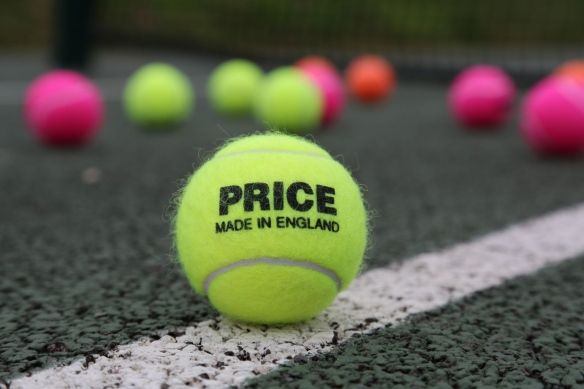Once the manufacturer to some of the industry’s biggest names, Price of Bath has adapted to every challenge and is still in business after 80 years.
In its heyday in the 1970s, Price of Bath was producing 80,000 tennis balls a week for the likes of Wilson, Dunlop France and Spalding. However, the advent of cheap tennis balls manufactured in the Far East saw the company lose its large volume business.
Where once there was a team of 120 on the factory floor producing rubber balls as well as rubber mouldings (during World War II ball production ceased and the company manufactured tyres and anti-vibration units for ship engines), they are now a much leaner team, and any new hires have been office based geared towards the digital markets.
With founder Joseph’s granddaughter Louise taking the helm from her father Derek, the only remaining tennis ball manufacturer in the UK, and indeed the western world, continues to defy the odds.
“It’s hard competing against the Far East manufacturing prices but I think the fact we managed to be so versatile and discover new markets and niches and have survived so many different challenges is remarkable, and something to be quite proud of,” said Louise, a former teacher who joined the family business after the birth of her third child in 2012.
“Looking back we were so busy concentrating on everyone else’s brand and white labelling for them, we created a non-brand, a hidden brand,” says Louise. “Lots of people still don’t know we exist today.”
Priding itself on being small enough for rapid response yet big enough to meet most requirements, Price of Bath’s focus is on quality over quantity.
The balls are still made in the same way; the rubber is milled and the half shells are moulded and joined before the balls are covered by hand using the best quality cloth to ensure a high-grade ball that lasts.
“Obviously we can’t compete with prices of goods made in the Far East but we are able to compete on bespoke, low volume orders,” explains Price.
“That has probably been our saving grace really. With good old-fashioned secure techniques and having the development expertise that makes a quality ball or a slightly different version of a ball sometimes wins over price.”
Whilst the bulk of their customers remains distributors or trade, the biggest growing market is selling directly to consumers, Price of Bath specialises in niche and customised balls, such as two-tone coloured balls, balls personalised with a player’s name, or even scented balls smelling of freshly cut grass.
Sensing an opportunity, Price set up marketplaces with online retailers such as Amazon, eBay and Not On The High Street, which has enabled Price of Bath to get its brand seen by a larger audience.
Typical orders now may include a batch of coloured customised balls emblazoned with an estate agent’s logo as sponsor, or an order for custom-made balls commemorating a tennis club’s centenary.
Research and development continues apace now that Louise has taken over the day-to-day running of the business, allowing her father Derek to concentrate on new products, such as the glow in the dark balls, a lighter softer pressureless balls, and a sponge ball, which had been put on the backburner.
“We make court calibration balls, balls for training, balls for the visually impaired, balls that are softer off the racket for the older generation, and a reaction ball with an unpredictable bounce for practice,” explains Louise as she reels off examples of the company’s offering.
It is not the first time Price of Bath has invested time and resources into development. Back in the 1990s, with the company losing its bulk-order business, a shift in focus was required. Working with the LTA and ITF, the company produced the first Mini Red ball for juniors.
“Not only is it a bigger, softer ball with a lower bounce but it has walls so thin that it’s very hard to not collapse,” explains Louise. “There was no budget for development; all the ball makers were invited to do the development work but our company was the only company that took the risk.
“We made the investment into a new market and it saved us probably – that ball became our biggest seller. We continue to sell quite a lot of that ball. It certainly put us on the map with a lot of coaches, clubs and schools and we are often told that ours is best ball to play with, and the longest lasting.”
While the company continues to evolve – one crucial part of the company’s business is due for a much-needed upgrade.
“Our website is almost as old as me,” jokes Louise. “My dad built the website himself when the internet started taking off – we needed a website so people could find us, it does that very well still today.
“Whilst the website is geared up for online sales and generates enquires we are working on a new website which will be more up to date. We shall be moving from a jpricebath.co.uk website to priceofbath.com, allowing us to access the global markets more easily.
“The back end of our new website means we will be able to tap into Google shopping and expand through the use of social media. It’s going to be something that continues to grow but it has been a massive learning curve for me.”
The company is very different to the business Joseph Price set up in 1936 in the village of Box on the outskirts of Bath, but Price of Bath has successfully evolved and adapted to survive in the 21st Century, whilst still retaining its history and heritage.
